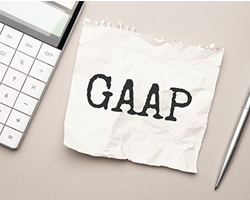Is GAAP becoming less ‘generally accepted?’
August 18, 2023 | Faye Hayhurst, CPA

For anyone who’s studied accounting, GAAP is an acronym you learn early on, as it’s much easier to talk about GAAP than to say, “Generally Accepted Accounting Principles.” As the full name implies, however, GAAP is a commonly recognized set of rules and procedures to govern accounting and financial reporting.
The Financial Accounting Standards Board (FASB, another key acronym) is the primary body that establishes GAAP. While double-entry bookkeeping is nearly as old as time, accounting rules have evolved quite a bit — especially in the past four decades — as needed to respond to new types of transactions and complexities.
The standard-setting process of FASB is anything but impulsive. Proposed changes or additions to existing standards are vetted through an exposure draft process, and comments submitted to FASB in response to the exposure are evaluated and added to the deliberative process.
Any new standard that is finally issued by FASB becomes a part of GAAP, and financial statements that purport to be in accordance with GAAP need to incorporate new guidance. CPAs may grouse a bit about new standards, but they usually learn about them and go on their way.
But something has happened in the past few years. First, it was the revenue recognition standard (“revrec” for short) in ASC 606. Much hullaballoo was made about this standard, which would affect nearly every single entity out there. In the end, a few industries were impacted significantly while many (most?) were impacted very little. But even those whose method of recognizing revenue didn’t change were required to add new footnote disclosures. These disclosures can take some effort to prepare, and the jury is out as to whether users of the financial statements find them useful. Still, in the end the standard felt to many people like exaggerated hype.
Looking at ASC 842
Now it’s the new lease standard, ASC 842. The fact that the effective date of this standard was delayed multiple times over several years is the first clue that it’s problematic. There were many warnings about the difficulty of implementing the standard, and this time it was all true.
The MNCPA implemented ASC 842 for our own financial statements a year earlier than required. We were at the start of a renewed lease for office space, and it made sense to us to do it then. This was only one lease — albeit with a fair number of quirks — but the time it took to figure out how to implement the standard and for our auditors to evaluate whether we did it correctly was considerable.
ASC 842 ended up causing a bit of a stir at the 2023 AICPA Peer Review Conference, where one session consisted of representatives from the Private Company Council holding a forum to discuss what’s happening with their body. For those not familiar with them, the PCC is the primary advisory body to the FASB on private company matters. They advise the FASB on possible alternatives within GAAP to address the needs of users of private company financial statements. They presented at the conference as part of their role of reaching out to private company stakeholders.
Conference attendees could submit questions to the PCC panel, and questions entered in the conference app could be voted up in importance by other attendees. The No. 1 question submitted — voted up by 77 out of about 500 attendees — was, “Is it too late to just get rid of the entire leasing standard 842 for private companies? For most of these entities, the only user is a local or regional bank that doesn’t want or understand the standard anyway.”
BAM! Someone gave voice to what apparently a lot of people are thinking (For the record: the answer to the question from the PCC panel was that the standard is not going away). There were additional comments and follow-up, including several attendees who reported clients switching to a different basis of accounting other than GAAP, so they didn’t have to implement a lease standard that they saw as adding no value. Other attendees reported issuing — at their client’s choice — a financial statement report with an exception from GAAP related to leases. This again was because the cost and effort to implement the standard were viewed as out of proportion to any value.
To GAAP or not to GAAP?
I have my own views about the lease standard and sometimes question the usefulness of the information it provides about the MNCPA. But I never seriously considered not adopting it because we follow GAAP. GAAP has been the gold standard, and to use a different accounting framework has seemed, to me, like taking the easy (or less serious) way out. But what if it turns out that non-GAAP reporting is actually the better choice for many entities?
Maybe I’m getting sentimental, but it makes me a little sad that an increasing number of entities feel that GAAP doesn’t make sense for them. What does it mean for financial reporting in general when there are a greater number of variations from GAAP reporting being used? Can the preparers (not to mention the users) of financial statements keep track of what the differences are between various financial statement frameworks? For that matter, do many users even understand the information GAAP requires to be presented?
Perhaps it’s inevitable in a world where humans dream up increasingly complicated transactions: Will the term “generally accepted” reach a sunset? Even if so, let’s remember that the focus of financial reporting should always be about presenting information in a way that provides the best information to those who need it, GAAP or no GAAP.
Topics: Accounting & Auditing
Faye Hayhurst, CPA

Faye Hayhurst is the MNCPA director of finance and administration. She is committed to using numbers to tell relevant stories, although she also employs words, charts and occasionally clothing to communicate a message. While some have questioned her about the pressures of being the CPA for the MNCPA, Faye considers presenting financial information to fellow CPAs a dream job. Outside of storytelling with numbers, Faye enjoys directing her church's handbell choir, visiting national parks and other scenic places, and checking out the chocolate products at Trader Joe's. Faye can be reached at 952-885-5540 or fhayhurst@mncpa.org.
Blog Posts by this author